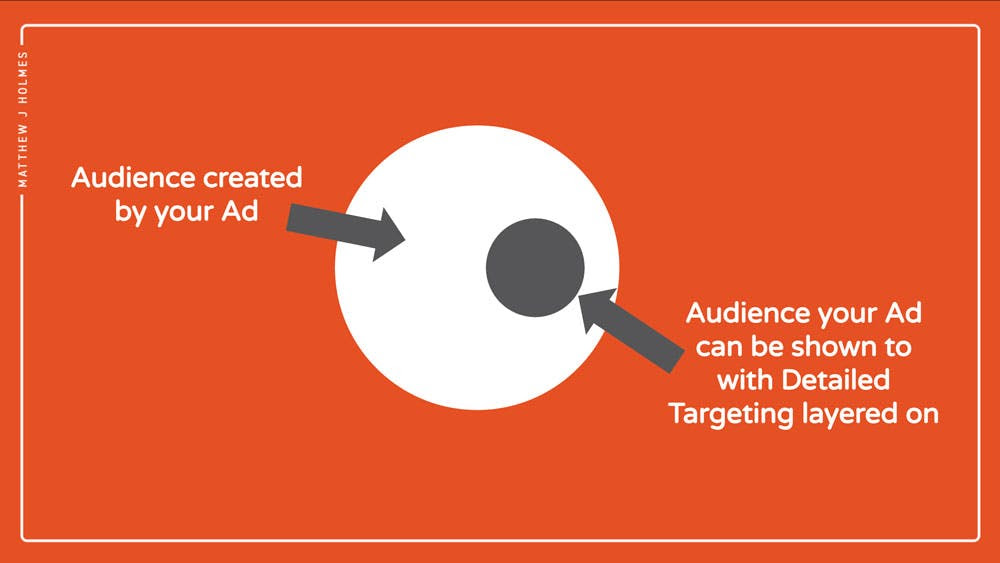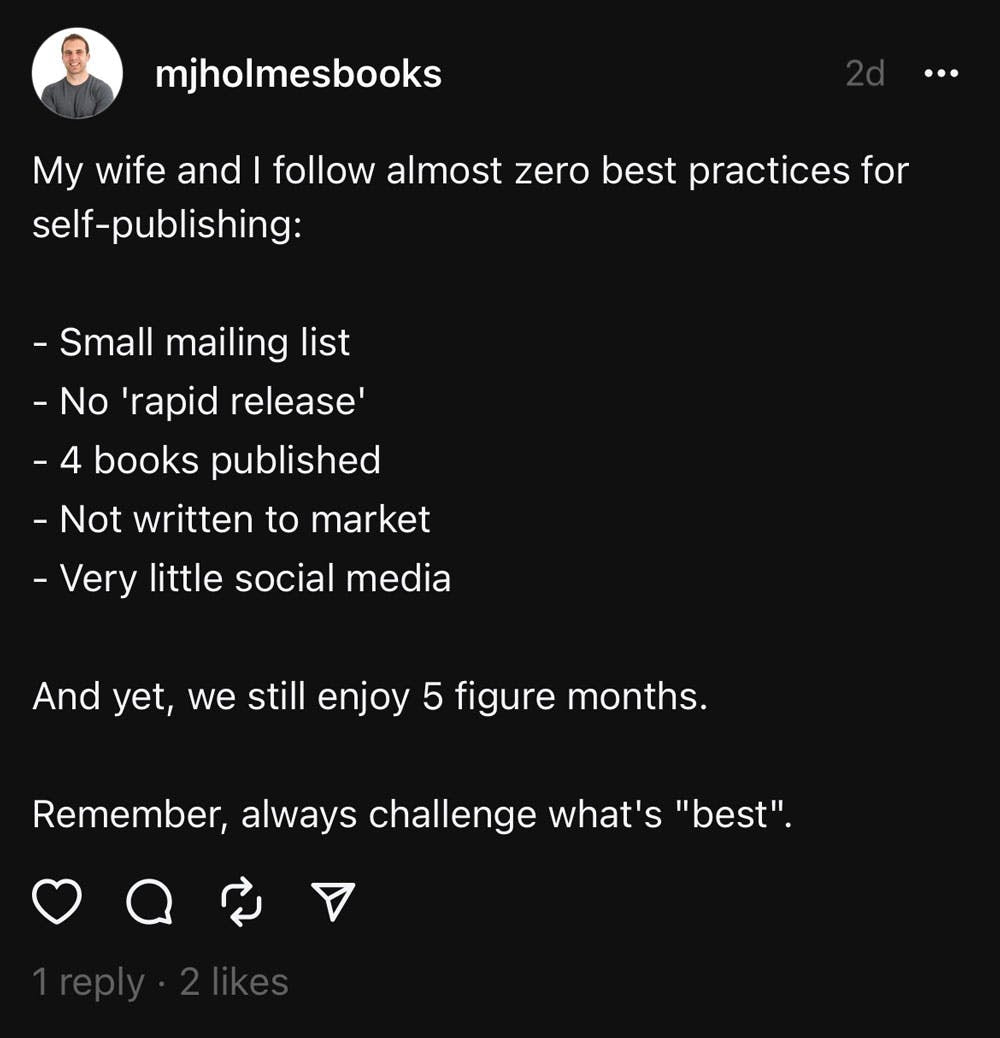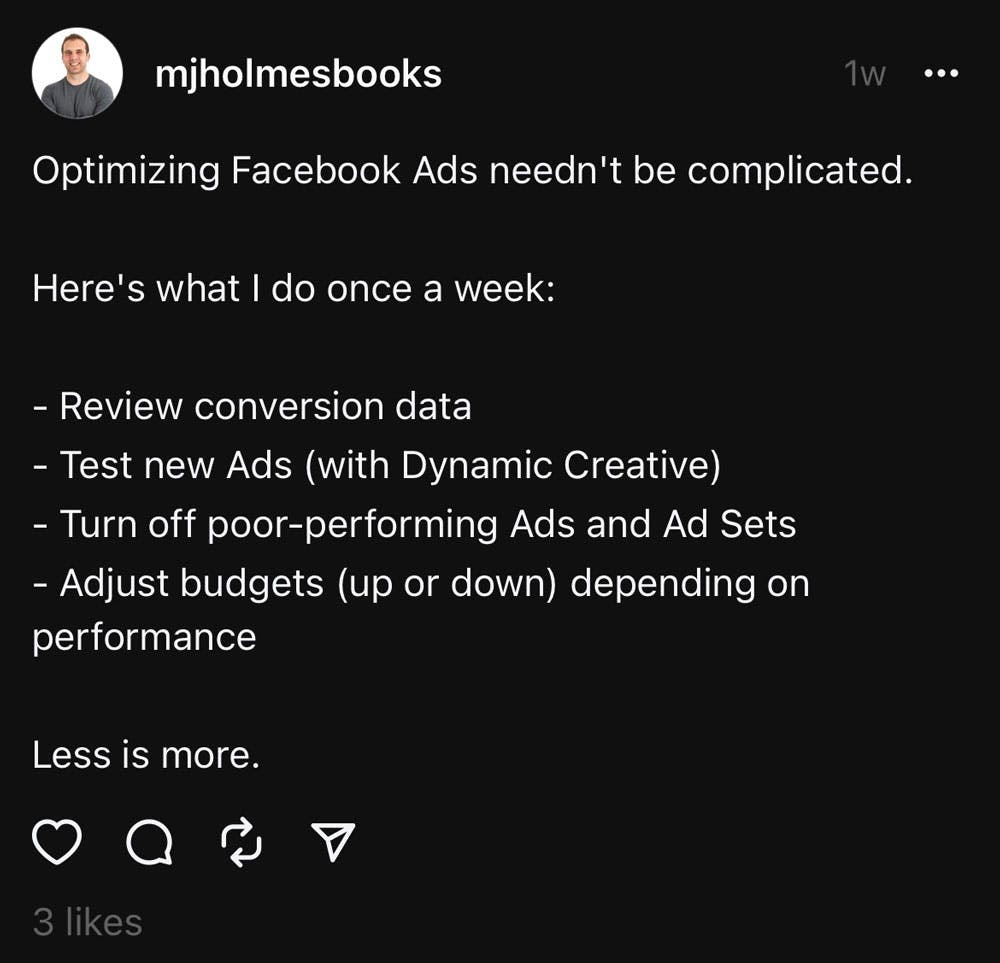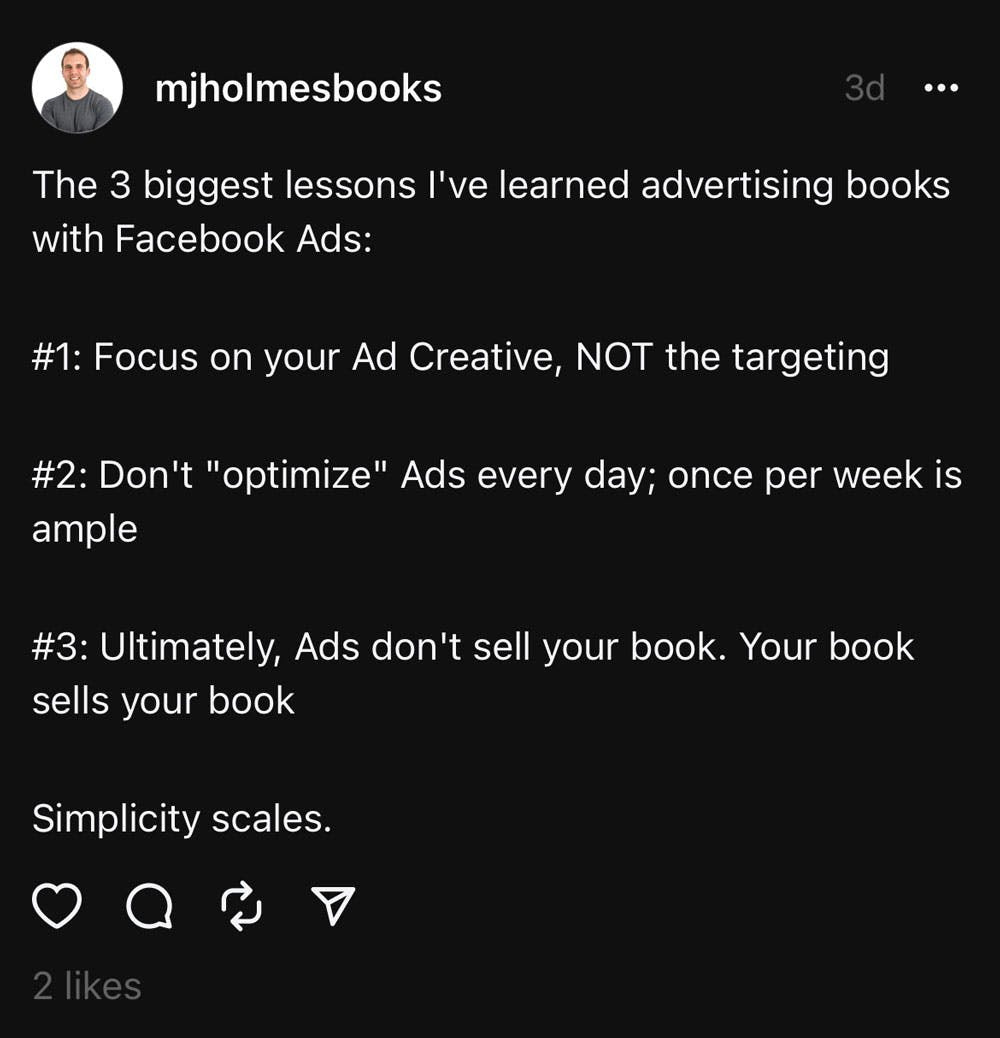
#029: How To Target Your Ideal Audience With Facebook Ads [Without Targeting]
Jul 22, 2023Read Time: 5 Minutes
When it comes to targeting with Facebook Ads, the route many authors take is to target:
- Traditionally Published Authors
- Genres (e.g. Crime Fiction, Fantasy Books, etc.)
- As well as the standard demographic targeting (location, gender and age)
And up until the end of 2022, I was doing exactly this. It just worked.
But then our Facebook Ads performance took a steep nose dive; royalties dropped, bestseller ranks dropped, and royalties dropped.
So, after much research and testing of my own, I discovered a new way to run Facebook Ads that went against every "best practice" out there (something my wife and I find we do a lot!).
Once I'd got this new strategy dialed in, our conversion rates tripled in the UK and doubled in the USA.
And in today's edition of The Saturday Self-Published Author, I'll be sharing how this strategy works and how it leverages Facebook's machine-learning to its absolute maximum.
The Secret
As with many things in life, the answer to most problems is less is more.
The 80/20 rule (Pareto's Principle) is something that has worked its way into many areas of my own life, including Facebook Ads.
I keep things simple, allowing me to have one focused session per week on our Facebook Ads, then step back and let Facebook do its thing, without any interference from me.
Many authors show their Facebook Ads to people who have an interest in specific:
- Traditionally Published Authors
- Genres
- TV Shows
- Movies
- Interests
This is known as Detailed Targeting.
What if I told you that you could forget about all of that and never test another audience again?
Sounds too good to be true, right?
Well, this time, it isn't. And its a breath of fresh air.
With Facebook Ads, the more criteria you layer onto your targeting, the harder the algorithm has to work to find your audience, and therefore, the more your results are going to suffer.
The answer to this is Unrestricted Targeting, which consists of targeting:
- Location
- Gender
- Age
Nothing more. Nothing less.
I haven't used Detailed Targeting with my Facebook Ads since the beginning of 2023; I've been solely focused on Unrestricted Targeting, and I haven't looked back since.
If you want to dive deeper into Unrestricted Targeting and transform your Facebook Ads using a proven strategy to scale your results, check out Facebook Ads Mastery For Authors here.
The Issues With Detailed Targeting
Detailed Targeting comes with a host of issues that can and will have a huge impact on your Facebook Ads results, and therefore, the overall performance of your author business.
Whilst these 3 issues below aren't the only problems with Detailed Targeting, they are the most common, and most painful – as I can allude to from first-hand experience.
Audiences Being Removed
The biggest issue for me is that Facebook are consistently removing audiences for you to target.
So, if you do manage to find an audience that works, there's every chance Facebook might remove it one day.
And if that happens, then what?
You have to start again and find another audience to test and target.
If this happens to you (as it has to me), you've essentially invested in an asset that is now worthless.
Performance Will Dwindle Over Time
A very noticeable side-effect of Detailed Targeting is that, whilst performance may start off well, over time, it's going to become worse and worse:
- Conversion Rates will drop
- CPCs (Cost-Per-Clicks) will rise
- CTRs (Click-Through Rates) will drop
- CPMs (Cost Per 1,000 Impressions) will rise
When you first start testing a new audience, you may think you're onto something in the beginning.
But give it a few weeks, sometimes a few months, even, and you'll notice a drop off in performance; no matter what you do:
- New Ad Creative
- More Daily Budget
- Different Placements
Nothing seems to get things performing like they were in the beginning.
This is exactly what happened to me – and it hurt.
Diminishing Returns When Scaling
The whole purpose of Facebook Ads is to reach as many of the right people as possible for your budget.
So, when you find some winning Ads you want to scale up (i.e. spend more), with Detailed Targeting, you'll reach a point of diminishing returns.
By this, I simply mean that you won't be able to spend more than a certain amount without it becoming more and more unprofitable.
For most authors, this point of diminishing returns ranges between $100 - $200 per day, per book/series (in rare cases a touch higher), across all Campaigns and/or Ad Sets for that book/series.
So, if you want to spend more than $100 - $200 per day on Book 1 of a four-book series, for example, you're going to find it difficult to do so profitably.
Granted, the more you spend, the lower your ROAS (Return on Ad Spend) will be; that's just the nature of scaling on any Ads platform.
This issue may not be a problem when you're spending $10 - $100 per day.
But when you have good-performing Ads that you want to spend $100's, even $1,000's per day on, and still make a profit, it becomes a big problem to have.
Thankfully, all of these (and more) issues can be resolved with Unrestricted Targeting.
How Unrestricted Targeting Works
Facebook Ads create their own audiences by analyzing the content of your Ad Creative itself, including, but not limited to:
- Words in your Images
- People in your Images
- Words in your Headline
- Words in your Primary Text
- Facial Expressions of people in your Images
- The website page where you are sending people from your Ad
The algorithm, AI (Artificial Intelligence) and machine learning of Facebook Ads is mind-boggling.
From this data, the algorithm will find people who have shown an interest in posts, Ads, websites visited, etc, that are related to what it sees and reads in your Ads, and create an audience of these people to show your Ads to.
When you layer on Detailed Targeting, you are throttling the algorithm and severely limiting your Ads' reach, and preventing the algorithm from finding people who are truly a good fit for your Ads, as the image below illustrates.

A Word of Warning
As you're not giving Facebook any clear direction on who to show your Ads to because you're not using Detailed Targeting, the algorithm does have to work a little harder in the beginning.
As a result, the performance of your Ads can be a little... disappointing for the first few days. Not always, but it can happen.
And you might be thinking... "What's Matt on about, Unrestricted Targeting is useless!"
All I ask though, is that you give it time.
It can take anywhere from 1-3 weeks, in my experience and the experience of other authors who I have shared this strategy with for things to really gain traction.
So, yes, in the short term, things may not look too good.
But if you expand that time out, long-term, Unrestricted Targeting will knock the socks off Detailed Targeting.
Final Words
If there's one thing that I love (and authors who have taken my Facebook Ads Mastery For Authors course love), it's the simplicity of the Unrestricted Targeting strategy.
Simplicity not only reduces the amount of time you need to spend on your Facebook Ads each week; it also helps the Facebook algorithm work more efficiently.
I understand it can be scary switching strategies, but if you're just not seeing the results you want from Facebook Ads, or you're looking for some sort of structure, a system to follow that delivers results, the Unrestricted Targeting strategy will do just that.
But I wouldn't recommend going cold turkey on your current strategy if it's currently working well.
Instead, I would suggest gradually transitioning to Unrestricted Targeting, by starting small, and slowly but surely moving budget away from your Detailed Targeting Campaigns and into your Unrestricted Targeting Campaigns, as you begin to see the results.
If you're brand new to Facebook Ads or are well seasoned with them but are new to this strategy, I strongly recommend committing to this for 90 days.
I'm confident that you will see results within 30 days, but 90 days is a longer time frame that will provide you with the confidence to continue and go all-in on Facebook Ads for the long term.
To Your Success
– Matt



